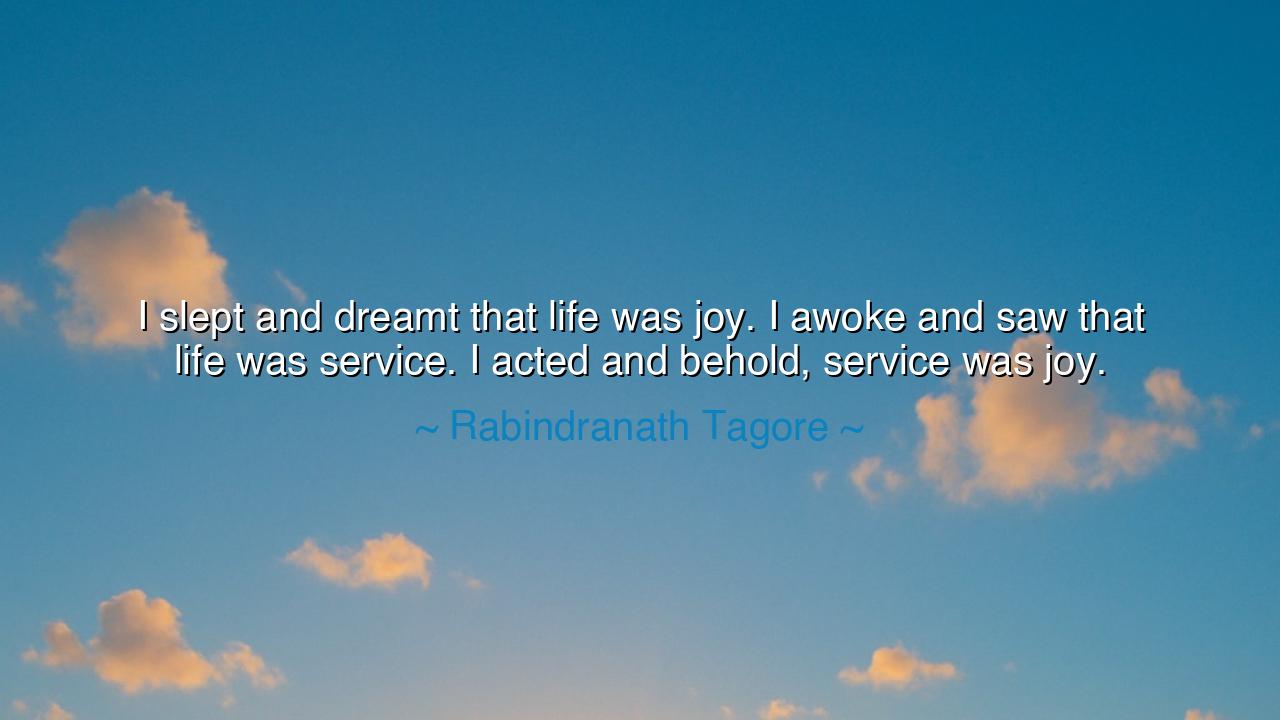
I slept and dreamt that life was joy. I awoke and saw that life
I slept and dreamt that life was joy. I awoke and saw that life was service. I acted and behold, service was joy.






“I slept and dreamt that life was joy. I awoke and saw that life was service. I acted and behold, service was joy,” wrote Rabindranath Tagore, the poet-sage of Bengal, whose words weave together dream and awakening, heart and action, illusion and truth. In this radiant verse, Tagore unveils a timeless revelation — that true joy does not lie in pleasure or possession, but in service, in the quiet act of giving oneself to others. The quote reflects the journey of the soul from ignorance to wisdom, from self-centered desire to the freedom of compassion. It is both a confession and a commandment — a testimony that joy, when sought for its own sake, vanishes like mist; but when sought through love and service, it becomes eternal.
The origin of this thought lies deep in Tagore’s spiritual philosophy, which blossomed from both Eastern mysticism and humanist ideals. He was born into a world of privilege, yet his heart burned with empathy for the suffering and the forgotten. In the tranquil groves of Santiniketan, where he founded his school, he taught that learning must not end in self-adornment but in self-giving. The poet who once dreamt of life’s pleasures awoke to a higher truth — that service is the purest expression of the divine. For to serve is not to lose oneself; it is to discover the boundless within the act of giving.
When Tagore says, “I slept and dreamt that life was joy,” he speaks of the illusion of youth — the dream that happiness is found in comfort, beauty, or success. It is a dream shared by many, for the human heart at first seeks joy through what it can touch and own. But this joy is fragile; it fades with time, as a morning flower fades under the sun. To “awake,” then, is to see beyond illusion — to realize that joy cannot be possessed, only shared. The awakening is spiritual, the dawn of compassion, when the heart begins to see that life’s deepest meaning lies not in taking, but in giving.
In the next line — “I awoke and saw that life was service” — the poet discovers the secret of purpose. Here service is not servitude, nor the act of mere obligation, but a state of harmony with the greater whole. It is the realization that one’s life is part of a vast, breathing world — that to lift another’s burden is to lighten one’s own. Just as rivers flow to nourish the fields, so too must a human being pour forth his strength for others. To serve is to live in rhythm with the universe, to act without pride or demand, knowing that every selfless deed is a prayer made visible.
The transformation completes itself in the final revelation: “I acted, and behold, service was joy.” Only in action does wisdom become truth. To know that life is service is noble; to live it is divine. In giving, Tagore found that the joy he once sought in dreams was not lost — it was reborn, purer and deeper than before. This is the great paradox: what we cling to, we lose; what we give, returns a thousandfold. The joy of service is not the fleeting pleasure of reward, but the steady flame of purpose. Those who act for others awaken to a joy that no loss can diminish, no sorrow can extinguish.
Consider the life of Mother Teresa, who left her home and comfort to serve the dying in the streets of Calcutta. To many, her world seemed filled with pain and deprivation. Yet when asked why she smiled, she said, “I see Christ in every face I touch.” Like Tagore, she discovered that the greatest joy is not in being served, but in serving. Her hands were calloused, her nights sleepless, yet her heart burned with peace. Such is the truth of Tagore’s vision — that the soul, when it forgets itself in love, finds its own immortality.
From this teaching flows a simple, eternal lesson: do not chase joy — create it through service. Do not seek meaning in what you can gain, but in what you can give. Let every act, however small, be offered with love — a word of comfort, a moment of patience, a gift of your time. The world does not need more brilliance; it needs more kindness. And in this, you will find that your life, too, becomes poetry — a song written not in words, but in deeds of compassion.
So, dear listener, remember Tagore’s wisdom: awaken from the dream of joy, and live the truth of service. For when you act with a pure heart — when you give, forgive, and uplift — you will find what the poet found: that service is not the end of joy, but its beginning. The dream ends, the awakening begins, and in that sacred exchange, life becomes what it was always meant to be — a radiant offering of love.






AAdministratorAdministrator
Welcome, honored guests. Please leave a comment, we will respond soon